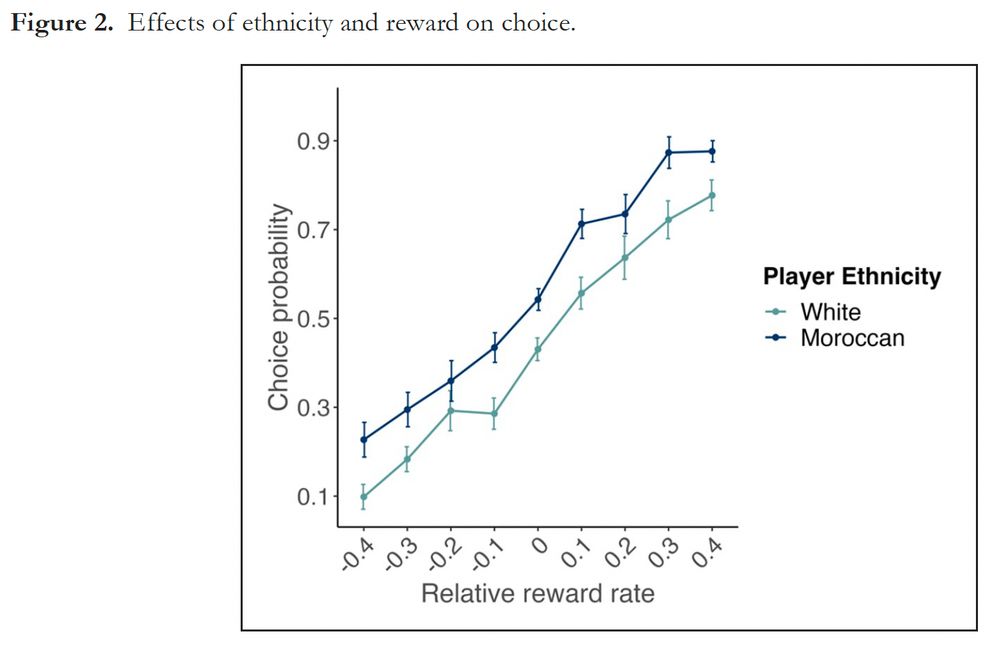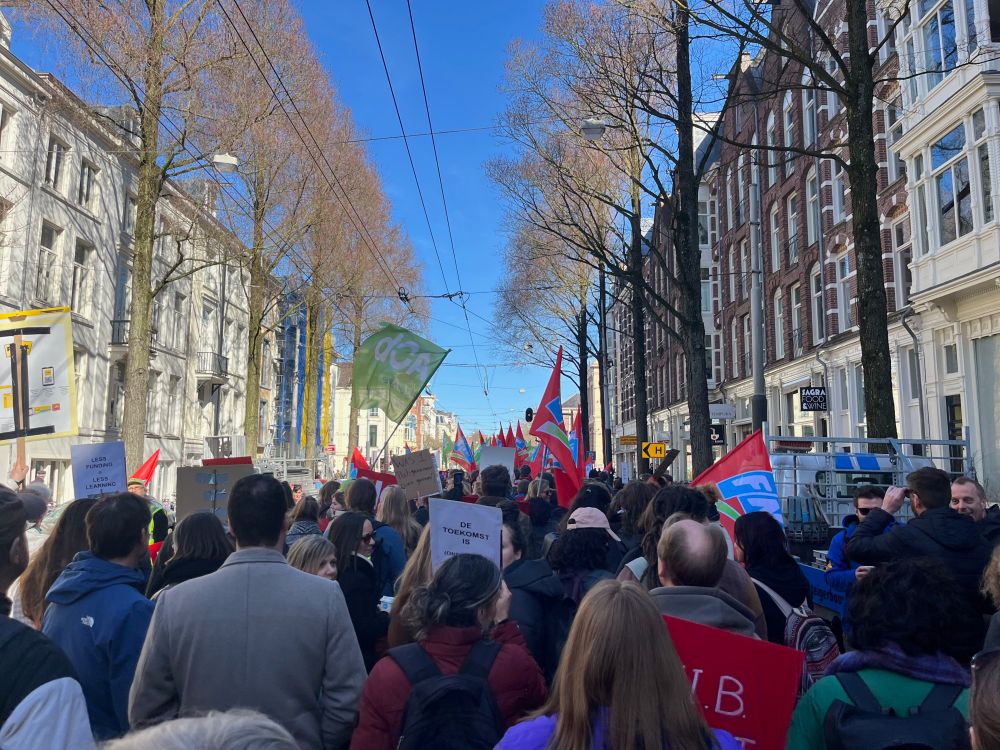
David Amodio
@davidamodio.bsky.social
Social Psychology Prof at University of Amsterdam. Prejudice & social cognition using experimental, computational, neuro, & AI approaches.
Stephen Colbert is a national treasure!
My career peak was when he devoted a whole segment to our paper on scarcity & race perception on The Colbert Report (!) And of course he nailed it.
Sadly it's not on youtube anymore, but it's on AppleTV (Season 10, Episode 119, on June 16, 2014).
My career peak was when he devoted a whole segment to our paper on scarcity & race perception on The Colbert Report (!) And of course he nailed it.
Sadly it's not on youtube anymore, but it's on AppleTV (Season 10, Episode 119, on June 16, 2014).

July 22, 2025 at 5:20 AM
Stephen Colbert is a national treasure!
My career peak was when he devoted a whole segment to our paper on scarcity & race perception on The Colbert Report (!) And of course he nailed it.
Sadly it's not on youtube anymore, but it's on AppleTV (Season 10, Episode 119, on June 16, 2014).
My career peak was when he devoted a whole segment to our paper on scarcity & race perception on The Colbert Report (!) And of course he nailed it.
Sadly it's not on youtube anymore, but it's on AppleTV (Season 10, Episode 119, on June 16, 2014).
No Kings Amsterdam MVP

June 14, 2025 at 6:04 PM
No Kings Amsterdam MVP
No Kings Amsterdam!

June 14, 2025 at 6:02 PM
No Kings Amsterdam!
To begin to address this issue, we offer concrete recommendations for establishing valid methods in social psychology experiments (with a focus on motivation and emotion work).

June 13, 2025 at 2:13 PM
To begin to address this issue, we offer concrete recommendations for establishing valid methods in social psychology experiments (with a focus on motivation and emotion work).
This figure illustrates tasks designed to measure different components of impressions rooted in different memory systems.
Note that declarative processes can be measured explicitly or implicitly, but nondeclarative processes can only be measured implicitly (i.e., indirectly).
Note that declarative processes can be measured explicitly or implicitly, but nondeclarative processes can only be measured implicitly (i.e., indirectly).

May 12, 2025 at 5:25 PM
This figure illustrates tasks designed to measure different components of impressions rooted in different memory systems.
Note that declarative processes can be measured explicitly or implicitly, but nondeclarative processes can only be measured implicitly (i.e., indirectly).
Note that declarative processes can be measured explicitly or implicitly, but nondeclarative processes can only be measured implicitly (i.e., indirectly).
A memory systems model also clarifies the nature of implicit social cognition:
Semantic and episodic memory are declarative (capable of explicit expression) & subject to awareness, whereas instrumental (incl habit) and Pavlovian are nondeclarative and only expressed indirectly/implicitly.
Semantic and episodic memory are declarative (capable of explicit expression) & subject to awareness, whereas instrumental (incl habit) and Pavlovian are nondeclarative and only expressed indirectly/implicitly.

May 12, 2025 at 5:25 PM
A memory systems model also clarifies the nature of implicit social cognition:
Semantic and episodic memory are declarative (capable of explicit expression) & subject to awareness, whereas instrumental (incl habit) and Pavlovian are nondeclarative and only expressed indirectly/implicitly.
Semantic and episodic memory are declarative (capable of explicit expression) & subject to awareness, whereas instrumental (incl habit) and Pavlovian are nondeclarative and only expressed indirectly/implicitly.
This model of impression formation reflects the structure & function of known memory systems and their neural substrates.
With such a model, we can draw from the learning & memory work to explain how aspects of an impression form, operate in concert & guide judgment, behavior, affect & perception.
With such a model, we can draw from the learning & memory work to explain how aspects of an impression form, operate in concert & guide judgment, behavior, affect & perception.

May 12, 2025 at 5:25 PM
This model of impression formation reflects the structure & function of known memory systems and their neural substrates.
With such a model, we can draw from the learning & memory work to explain how aspects of an impression form, operate in concert & guide judgment, behavior, affect & perception.
With such a model, we can draw from the learning & memory work to explain how aspects of an impression form, operate in concert & guide judgment, behavior, affect & perception.
Impression formation is a multimodal process: we use every capacity available to us when we learn about people—semantic, episodic, instrumental, and Pavlovian—which together produce a holistic impression.
This view departs from prior models which assume a basis in only semantic memory.
This view departs from prior models which assume a basis in only semantic memory.

May 12, 2025 at 5:25 PM
Impression formation is a multimodal process: we use every capacity available to us when we learn about people—semantic, episodic, instrumental, and Pavlovian—which together produce a holistic impression.
This view departs from prior models which assume a basis in only semantic memory.
This view departs from prior models which assume a basis in only semantic memory.
Social Psychologists: SESP is in Lisbon this year (Oct 16-18)!
*The symposium submission deadline is May 16*
More info & the submission portal here: www.sesp.org/annualconfer...
*The symposium submission deadline is May 16*
More info & the submission portal here: www.sesp.org/annualconfer...

May 9, 2025 at 1:02 PM
Social Psychologists: SESP is in Lisbon this year (Oct 16-18)!
*The symposium submission deadline is May 16*
More info & the submission portal here: www.sesp.org/annualconfer...
*The symposium submission deadline is May 16*
More info & the submission portal here: www.sesp.org/annualconfer...
Together, these effects work to impede impression updating.
Importantly, this effect is exaggerated by the moral content of stereotypes. You can see it in this trial-by-trial plot.
By contrast, nonmoral stereotypes created weaker expectancies and were fully updated after repeated interactions.
Importantly, this effect is exaggerated by the moral content of stereotypes. You can see it in this trial-by-trial plot.
By contrast, nonmoral stereotypes created weaker expectancies and were fully updated after repeated interactions.

April 15, 2025 at 12:28 PM
Together, these effects work to impede impression updating.
Importantly, this effect is exaggerated by the moral content of stereotypes. You can see it in this trial-by-trial plot.
By contrast, nonmoral stereotypes created weaker expectancies and were fully updated after repeated interactions.
Importantly, this effect is exaggerated by the moral content of stereotypes. You can see it in this trial-by-trial plot.
By contrast, nonmoral stereotypes created weaker expectancies and were fully updated after repeated interactions.
Nevertheless, computational modeling showed that effect of ethnicity on instrumental learning involved the same mechanism—of (a) biased priors and (b) group-based updating—as in our other work.
So the model replicated, despite the different direction of the ethnicity effect.
So the model replicated, despite the different direction of the ethnicity effect.

April 4, 2025 at 12:02 PM
Nevertheless, computational modeling showed that effect of ethnicity on instrumental learning involved the same mechanism—of (a) biased priors and (b) group-based updating—as in our other work.
So the model replicated, despite the different direction of the ethnicity effect.
So the model replicated, despite the different direction of the ethnicity effect.
Unexpectedly, we found that White Dutch participants (UvA students) formed more positive impressions of Moroccan than White Dutch partners—despite anti-Moroccan attitudes on explicit and implicit measures!

April 4, 2025 at 12:02 PM
Unexpectedly, we found that White Dutch participants (UvA students) formed more positive impressions of Moroccan than White Dutch partners—despite anti-Moroccan attitudes on explicit and implicit measures!
In these studies, White Dutch participants played the money sharing game with White and Moroccan players.
(As in the JEPG work, player gender is counterbalanced)
(As in the JEPG work, player gender is counterbalanced)

April 4, 2025 at 12:02 PM
In these studies, White Dutch participants played the money sharing game with White and Moroccan players.
(As in the JEPG work, player gender is counterbalanced)
(As in the JEPG work, player gender is counterbalanced)
Computational models supported a biased-learning account, as in Schultner et al. (2024):
Race set expectancies for partners' behavior (i.e., a prior)
Then, subsequent updating of player reward value was encoded in terms of racial group, which impaired individuation & create a biased impression
Race set expectancies for partners' behavior (i.e., a prior)
Then, subsequent updating of player reward value was encoded in terms of racial group, which impaired individuation & create a biased impression

April 4, 2025 at 12:02 PM
Computational models supported a biased-learning account, as in Schultner et al. (2024):
Race set expectancies for partners' behavior (i.e., a prior)
Then, subsequent updating of player reward value was encoded in terms of racial group, which impaired individuation & create a biased impression
Race set expectancies for partners' behavior (i.e., a prior)
Then, subsequent updating of player reward value was encoded in terms of racial group, which impaired individuation & create a biased impression
However, the race effect was stronger for high-prejudice participants. Low-prej Ps were not influenced by race.
The effect also appeared implicit—participants' self-reports suggest they were unaware that race influenced their preferences.
The effect also appeared implicit—participants' self-reports suggest they were unaware that race influenced their preferences.

April 4, 2025 at 12:02 PM
However, the race effect was stronger for high-prejudice participants. Low-prej Ps were not influenced by race.
The effect also appeared implicit—participants' self-reports suggest they were unaware that race influenced their preferences.
The effect also appeared implicit—participants' self-reports suggest they were unaware that race influenced their preferences.
Did they?
Alas, but unsurprisingly, no—participants could not ignore race:
Besides learning individual sharing rates, participants formed stronger choice preferences for White over Black players—again, even though reward rate for Black and White players was identical on average.
Alas, but unsurprisingly, no—participants could not ignore race:
Besides learning individual sharing rates, participants formed stronger choice preferences for White over Black players—again, even though reward rate for Black and White players was identical on average.

April 4, 2025 at 12:02 PM
Did they?
Alas, but unsurprisingly, no—participants could not ignore race:
Besides learning individual sharing rates, participants formed stronger choice preferences for White over Black players—again, even though reward rate for Black and White players was identical on average.
Alas, but unsurprisingly, no—participants could not ignore race:
Besides learning individual sharing rates, participants formed stronger choice preferences for White over Black players—again, even though reward rate for Black and White players was identical on average.
In JEPG:
White American Ps played an interactive game with Black & White players: Ps choose a player to interact with and get feedback on whether the player shared $.
Players varied in sharing rate, but sharing was equated on race. To earn money, Ps needed to learn about individuals and not race.
White American Ps played an interactive game with Black & White players: Ps choose a player to interact with and get feedback on whether the player shared $.
Players varied in sharing rate, but sharing was equated on race. To earn money, Ps needed to learn about individuals and not race.

April 4, 2025 at 12:02 PM
In JEPG:
White American Ps played an interactive game with Black & White players: Ps choose a player to interact with and get feedback on whether the player shared $.
Players varied in sharing rate, but sharing was equated on race. To earn money, Ps needed to learn about individuals and not race.
White American Ps played an interactive game with Black & White players: Ps choose a player to interact with and get feedback on whether the player shared $.
Players varied in sharing rate, but sharing was equated on race. To earn money, Ps needed to learn about individuals and not race.
This is part of a well-organized series of demonstrations across the country—first, one at a time in each university city, and then culminating in a nation-wide protest.
Science friends in the US: You can do this too! It might be your only option.
Science friends in the US: You can do this too! It might be your only option.

March 17, 2025 at 9:26 PM
This is part of a well-organized series of demonstrations across the country—first, one at a time in each university city, and then culminating in a nation-wide protest.
Science friends in the US: You can do this too! It might be your only option.
Science friends in the US: You can do this too! It might be your only option.
In the Netherlands, higher ed is also under attack.
The rightwing cabinet proposes to cut > 1.2 billion euros from higher education and research in their new budget.
And we're not having it!
So today we joined ~5000 UvA workers for a strike and protest march to a rally at the Dam Square.
The rightwing cabinet proposes to cut > 1.2 billion euros from higher education and research in their new budget.
And we're not having it!
So today we joined ~5000 UvA workers for a strike and protest march to a rally at the Dam Square.

March 17, 2025 at 9:26 PM
In the Netherlands, higher ed is also under attack.
The rightwing cabinet proposes to cut > 1.2 billion euros from higher education and research in their new budget.
And we're not having it!
So today we joined ~5000 UvA workers for a strike and protest march to a rally at the Dam Square.
The rightwing cabinet proposes to cut > 1.2 billion euros from higher education and research in their new budget.
And we're not having it!
So today we joined ~5000 UvA workers for a strike and protest march to a rally at the Dam Square.
Nice—thanks Jay! It was a thrill to see Kay and Riana win their awards—so proud of my old NYU gang, too.
I got to celebrate with Kay and a great group of friends over dinner in Santa Fe. What a trailblazer!
I got to celebrate with Kay and a great group of friends over dinner in Santa Fe. What a trailblazer!

February 6, 2025 at 2:34 PM
Nice—thanks Jay! It was a thrill to see Kay and Riana win their awards—so proud of my old NYU gang, too.
I got to celebrate with Kay and a great group of friends over dinner in Santa Fe. What a trailblazer!
I got to celebrate with Kay and a great group of friends over dinner in Santa Fe. What a trailblazer!
Our students can be so thoughtful! I've had pneumonia this past month (it was awful) and missed the first few weeks of my Research Masters Seminar. But when I finally returned to teach my first class, the students greeted me with these beautiful flowers and a card they all signed! Made my day.

December 2, 2024 at 6:33 PM
Our students can be so thoughtful! I've had pneumonia this past month (it was awful) and missed the first few weeks of my Research Masters Seminar. But when I finally returned to teach my first class, the students greeted me with these beautiful flowers and a card they all signed! Made my day.
Setting up for my guest lecture today at the University of Amsterdam's Oude Lutherse Kerk (Old Lutheran Church).
What a room!
What a room!

November 28, 2024 at 3:06 PM
Setting up for my guest lecture today at the University of Amsterdam's Oude Lutherse Kerk (Old Lutheran Church).
What a room!
What a room!
The same mechanism is likely involved in disinformation effects: a one-two punch of disinformation paired with instrumental confirmatory learning.
It also suggests an intervention of providing counter info prior to instrumental learning—something we’re now testing.
It also suggests an intervention of providing counter info prior to instrumental learning—something we’re now testing.

November 4, 2024 at 2:35 PM
The same mechanism is likely involved in disinformation effects: a one-two punch of disinformation paired with instrumental confirmatory learning.
It also suggests an intervention of providing counter info prior to instrumental learning—something we’re now testing.
It also suggests an intervention of providing counter info prior to instrumental learning—something we’re now testing.
We believe this reflects a novel memory system interaction: explicit stereotypes are encoded in semantic memory, which then guides the (implicit) instrumental learning of choice preferences.
Indeed, this mechanism may explain most social knowledge-implicit attitude effects.
Indeed, this mechanism may explain most social knowledge-implicit attitude effects.

November 4, 2024 at 2:34 PM
We believe this reflects a novel memory system interaction: explicit stereotypes are encoded in semantic memory, which then guides the (implicit) instrumental learning of choice preferences.
Indeed, this mechanism may explain most social knowledge-implicit attitude effects.
Indeed, this mechanism may explain most social knowledge-implicit attitude effects.


